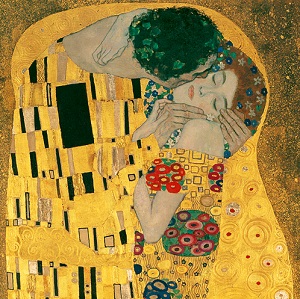 The kiss has inspired poems, paintings, and way too many songs to list here. Actors kiss in movies and it melts the hearts of people watching at home or in theaters. We paint our lips to make them appear more appealing to potential partners; we seek out time alone with our significant others to smooch in private. When there is no steady ‘other,’ we daydream about kisses to come.
The kiss has inspired poems, paintings, and way too many songs to list here. Actors kiss in movies and it melts the hearts of people watching at home or in theaters. We paint our lips to make them appear more appealing to potential partners; we seek out time alone with our significant others to smooch in private. When there is no steady ‘other,’ we daydream about kisses to come.
Basically, we as a species seem to really enjoy and celebrate the act of kissing.
So, what’s in this all-powerful thing known as the kiss, and why do we place such importance on it in choosing an intimate partner?
The easy answer is that we kiss because our bodies tell us to do it. Being in close proximity to someone to whom we are physically attracted or with whom we have been connecting on an emotional level triggers feelings of arousal and the desire to draw near—to touch, to embrace, and to press lips to lips.
With a new romantic interest, kisses can leave us swooning. As we make contact, our pulse quickens, our pupils dilate, our brains receive more oxygen, our facial muscles engage, and our cheeks flush. Our cranial nerves are stimulated and neurotransmitters are released—dopamine to make us crave more, serotonin to boost mood and establish a drug-like desire for the other person, and oxytocin to bond and attach us to that person (Kirshenbaum, 2011).
Although we associate the benefits of kissing with falling or being in love with someone, according to researchers, the drive to kiss a particular person may be almost entirely biologically based. Specifically, the act of kissing may be a way of reading another person’s health status and genetic compatibility, thereby tapping into the primal urge to mate and procreate based on a person’s likelihood of survival (Springer, 2013).
In a brief article on the subject, Sheril Kirshenbaum, author of The Science of Kissing: What Our Lips Are Telling Us, wrote, “It turns out that our sense of smell may be partially responsible [for our attraction or aversion to someone’s kisses], as we pick up subconscious clues about the other person’s DNA or reproductive status” (2011).
To gain a more comprehensive understanding of why we kiss, Oxford University researchers Rafael Wlodarski and Robin Dunbar administered an online questionnaire internationally to over 900 men and women who shared their thoughts on “the importance of kissing in both short-term and long-term relationships” (Springer, 2013).
The responses revealed that women, especially, are influenced by kissing when it comes to choosing and staying with someone. In early romantic exchanges, they gave kissing the credit for their feelings of attraction to their partners. And the frequency of kissing in long-term relationships was cited as an essential component of “relationship satisfaction” (Wlodarski and Dunbar, 2013a). With a longtime partner, kisses may become routine, but they may also temporarily reignite the initial sparks of longing and passion experienced in the early stages.
The menstrual cycle also appears to play an influential role in women’s perspectives on kissing; another report published by the same researchers revealed that women seek out and enjoy kissing more during the hormonally charged conception phase of their cycles (Wlodarski and Dunbar, 2013b).
Men, on the other hand, tend to engage in kissing as a “one thing leads to another” means of initiating sex, or as a way of alleviating stress or tension in a relationship, according to the research of evolutionary psychologist Gordon Gallup (Sun, 2011). However, this doesn’t mean they don’t enjoy kissing or similarly assess physical attraction based on how good it feels to kiss someone.
Gallup also posits that men tend to be the ones who seek out the “tongue contact” characteristic of what has become known as French kissing; this may be connected to an unconscious, biologically driven awareness that their testosterone-infused saliva has the ability to trigger receptivity and arousal in the person receiving it (Sun, 2011).
So, if someone’s kisses keep you coming back for more, there may be a straightforward scientific explanation for it: Your two sets of genes are highly compatible and your chemical messengers mesh well. Of course, it may also just be that you really like the person and kissing feels good, so you want more of it.
Either way, kissing is a simple way of experiencing the natural high produced by the body’s feel-good hormones, along with the stress-relieving comfort of touch and affection. Watch the PBS video below to learn more about “The Science of Kissing.”
References:
- Kirshenbaum, S. (2011, February 7). A kiss is not just a kiss. The University of Texas at Austin. Retrieved from http://www.utexas.edu/know/2011/02/07/science_kissing/
- Sun, F. (2011, February 11). The science of smooching: why men and women kiss differently. TIME. Retrieved from http://healthland.time.com/2011/02/11/the-science-of-smooching-why-men-and-women-kiss-differently/
- Springer Science+Business Media. (2013, October 10). Kissing helps us find the right partner—and keep them. ScienceDaily. Retrieved from http://www.sciencedaily.com/releases/2013/10/131010205142.htm
- Wlodarski, R., and Dunbar, R. I. M. (2013a, November). Examining the possible functions of kissing in romantic relationships. Archives of Sexual Behavior, Vol. 42, Issue 8, 1415-1423. Abstract retrieved from http://link.springer.com/article/10.1007%2Fs10508-013-0190-1
- Wlodarski, R., and Dunbar, R. I. M. (2013b, December). Menstrual cycle effects on attitudes toward romantic kissing. Human Nature, Vol. 24, Issue 4, 402-413. Abstract retrieved from http://link.springer.com/article/10.1007%2Fs12110-013-9176-x
© Copyright 2014 GoodTherapy.org. All rights reserved.
The preceding article was solely written by the author named above. Any views and opinions expressed are not necessarily shared by GoodTherapy.org. Questions or concerns about the preceding article can be directed to the author or posted as a comment below.
